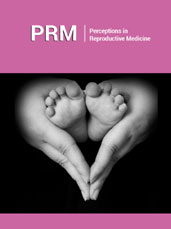- Submissions

Full Text
Perceptions in Reproductive Medicine
Book Review ‘Manual First 1000 Days Child Life: What Are Parents and Guardians Need to Know’
Uqbah Iqbal*
Managing Director, Pitas Agriculture, Kampung Mempakad Darat, 89100 Pitas, Sabah, Malaysia
*Corresponding author:Uqbah Iqbal, Managing Director, Pitas Agriculture, Kampung Mempakad Darat, 89100 Pitas, Sabah, Malaysia
Submission: April 15, 2024;Published: May 06, 2024

ISSN: 2640-9666Volume6 Issue1
Introduction
Written by Bahagian Pembangunan Kesihatan Keluarga, Jabatan Kesihatan Awam, Kementerian Kesihatan Malaysia, childcare in the first 1000 days of life is very important to make sure they can perfectly grow and resilient to next age. The quality of childcare needs to be improved and parents need to be given relevant knowledge and information. It can reduce morbidity and disability as well as reducing the death of children under 5 years old which can be prevented in line with Sustainable targets Development Goals. UNICEF has started the 1000 Days Program in 2010 which has given focus on healthy eating aspects throughout the early pregnancy of the mother until the child 2 years old. This initiative is also supported by the Ministry of Health Malaysia. This Manual of the First 1000 Days of a Child’s Life has been expanded to cover the scope of more holistic includes care during pregnancy, prevention of infectious diseases and non-infectious, child injury prevention as well as the mental well-being of mother and child. This manual is a manual to help health personnel in the field providing health advice to parents. This effort is expected to be able to help improve parents’ skills in facing the world of parenting especially for first-time parents.
This manual will be able to help health personnel in the field to assimilate and focus on important topics related to mother and child health. In addition, parents will be more confident with information and health information if it is delivered by health personnel. This manual was developed in line with the contents of the Baby and Children Health Record Book (0-6 years). It is as a reference for health personnel who are involved in the health care of babies and children in health facilities. The publication of this manual hopefully will give added value in health services to improve the health status of babies and children. The 1000 days of life was introduced by UNICEF in 2010. 1000 days of life is the time from the beginning of pregnancy to the age of the child reached 2 years. 1000 days is an important period of time in the basis of child development and growth. The comprehensive baby care from the womb to the age of 2 years not only to ensure that the content is born safely, but it is also even important that the baby can live healthy and grow perfectly. The size of a newborn baby’s brain is a quarter of the size of an adult’s brain. After that the baby’s brain size will continue to grow and reach 80% of the adult brain size before the age of 3 years and is almost the same size as the adult brain at age 5. As the brain grows in size, it also produces millions of synapses/connections between brain cells. The relationship between cells allows a person to move, think, communicate and do what only early childhood is a very important time in forming synapses/connections between cells. The results of a neurological study found that a baby’s experience at the beginning of life is important in their brain development [1]. Early experience experienced by baby, good relationship with parents/caregivers, adequate nutrition as well early learning is the basis for physical, cognitive, emotional development and their social. The health record book for babies and children (0-6 years) has been introduced in the 1980s. In the beginning, this record book was used to monitor immunization shots, growth and development of babies and children as well as monitor other health problems. After that started in 2008 test specific developmental screenings at specific time intervals are introduced. Today this record book includes an examination of growth and development, child health monitoring, immunization injection monitoring, MCHAT screening, hearing and vision screenings, parenting guides as well infant and child health education.
The development of the foetus and baby is also influenced by maternal factors starting from pre-pregnancy, during pregnancy and after delivery. Before pregnancy women should prepare for the pregnancy phase and ensure health status is in optimal condition. It is in line with WHO preparations recommendations from the pregnancy stage as one of the strategies in reducing morbidity and mortality of mother and infant. Among the main risk factors for women that need to be taken into account before pregnancy include chronic diseases, infectious diseases and lifestyle risks. After pregnancy a comprehensive antenatal and postnatal care is necessary to ensure maternal risk identified and managed according to guidelines. In conclusion the main objective of this manual is to help health workers give comprehensive health education for parents/guardians. The purpose of this manual is to increase the knowledge of health personnel about the development of babies and children, increase the knowledge of health personnel related to parenting skills, guidance of health personnel in providing advisory services to parents/guardians regarding baby and childcare.
References
- Family Health Development Division, Public Health Department, Ministry of Health Malaysia. Manual First 1000 Days Child Life: What Parents and Guardians Need to Know. Putarajaya: Ministry of Health Malaysia. 2023.
© 2024 Uqbah Iqbal. This is an open access article distributed under the terms of the Creative Commons Attribution License , which permits unrestricted use, distribution, and build upon your work non-commercially.
 a Creative Commons Attribution 4.0 International License. Based on a work at www.crimsonpublishers.com.
Best viewed in
a Creative Commons Attribution 4.0 International License. Based on a work at www.crimsonpublishers.com.
Best viewed in 







.jpg)






























 Editorial Board Registrations
Editorial Board Registrations Submit your Article
Submit your Article Refer a Friend
Refer a Friend Advertise With Us
Advertise With Us
.jpg)






.jpg)














.bmp)
.jpg)
.png)
.jpg)










.jpg)






.png)

.png)



.png)






